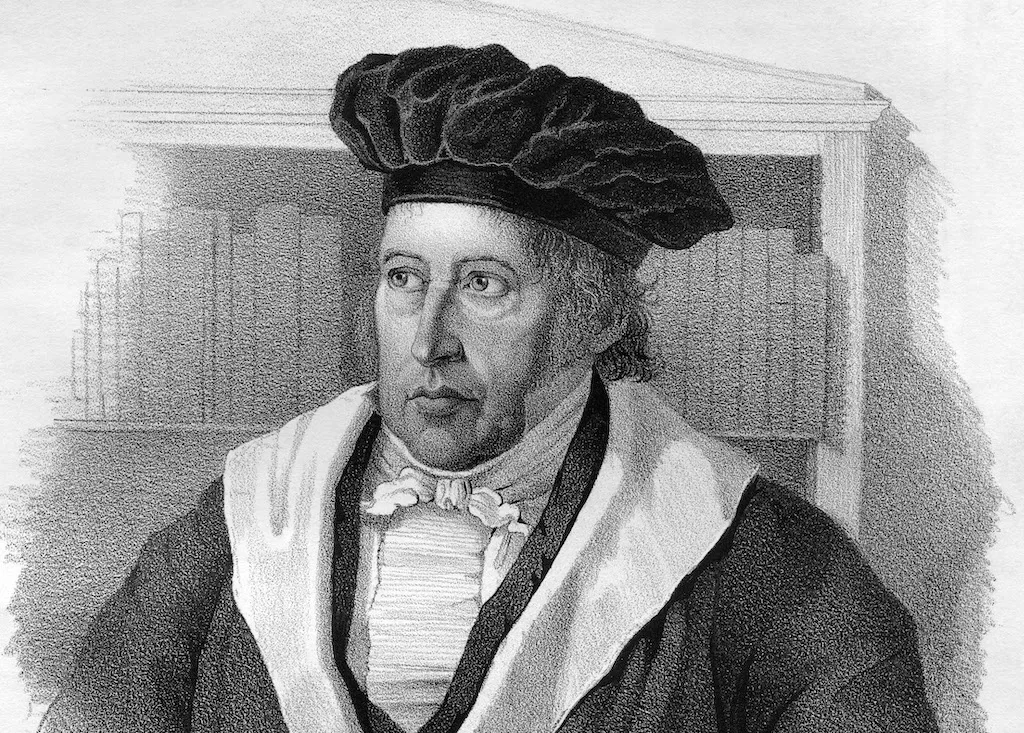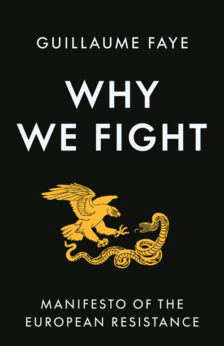The General Paradigm of the Hegelian System
Hegel expressed his views on politics most fully in The Philosophy of Right. These views are based on his philosophy as a whole and are an integral part of the entire system. Nonetheless, Hegel’s theory of the Political is quite originally laid out, and to identify his set of views on international politics, it should be briefly described.
First of all, it is worth recalling the general paradigm of Hegelian thought. It is built on the triadic principle formulated by Fichte: thesis — antithesis — synthesis. Fichte, in turn, derived it from the Neoplatonic tradition. Hegel himself did not use the expression ‘thesis — antithesis — synthesis’, although the structure of his dialectics constantly revolves around a similar triadic scheme.
According to Hegel, at the beginning of everything stands the Idea-in-itself or the subjective Spirit. This is the main thesis. Then comes the moment of negation. Thus, the Spirit negates itself, alienates itself, and becomes Nature. In this moment of negation, the Spirit ceases to be in-itself and becomes for-the-Other. But Nature and substance are not the first principle. It is just a moment of negation. Therefore, it is negative. Being negative, it indicates what it negates, by sublation, which simultaneously involves cancelling and elevating (Aufhebung). This tension between the two dialectical moments acts as the Spirit, organising and moving nature. There is a ‘potentiation’ of layers of external existence — from the physical-mechanical to the chemical, and finally, to the organic. This process of the unfolding of the Spirit is intellect. In humans, the intellect determines consciousness.
Organic life combined with human consciousness determines the third moment —negation of negation or synthesis. In humans, the Spirit enters its final turn, moving towards allowing the Idea to contemplate itself through humans, and the Spirit would become the Absolute Spirit, that is, the Idea-for-itself.
This is the general picture of Hegel’s system. In The Philosophy of Right, he focuses only on the human and the moments of their ‘potentiation’, the dialectics of movement through various layers of the self-revealing Spirit.
Hegel’s Thought Structure in The Philosophy of Right
Here Hegel deals with Roman law and the European tradition of interpreting law in what Carl Schmitt would later call ‘nomocracy’.
The second level, where the autonomous subject first emerges, i.e., the Spirit begins its work, is, according to Hegel, morality (die Moralität). Here, he turns to Kant’s practical reason. Hegel explains the transition from right to morality as the human acquisition of the first degree of self-reflection, the conquest of autonomy relative to the strict distribution of roles and statuses in the previous logically juridical field. The moral subject does not coincide with the legal (physical) person, i.e., it is someone greater than the individual. The system of relationships with other individuals and objects in the external world becomes more complex. But Hegel treats such a moral personality as a moment of departure from the social bonds, strictly defined in law, into the zone of interiority, i.e., immersion into oneself, into self-reflection. This is a gesture in the spirit of the cynic Diogenes, a sceptic who distances himself from society in the name of personal contemplation.
Only at the next, third level does a person enter the domain of the Political, where the fully fledged work of what Hegel calls ‘Spirit’ (Geist), which is the mainstay of all his teaching, begins. Here, Hegel entirely follows Aristotle. Hence the choice of term — the third domain Hegel calls ‘ethical life’ (die Sittlichkeit), corresponding to Aristotle’s concept of ethics (ἠθική, ἦθος). Hegel fundamentally distinguishes the often-interchangeable concepts of ‘morality’ and ‘ethics’. Usually, Hegelians follow his lead. Morality is the individual’s immersion into themselves, the first ability to separate one’s presence from the purely juridical abstraction of oneself as a person. In ethical life, however, a person enters into an active practical form of life, already reflected and having conquered moral subjectivity, but this time decisively turned towards allowing the higher spirit to realize itself through conscious ethical action. This is the moment of society’s birth.
We move to the third level through the steps of right — morality — ethical life (society).
Here again arises a tripartite division. The entire domain of ethical life is divided by Hegel into three moments: family — civil society — state. This is a precise continuation and development of Aristotle’s thought about ethics. According to Aristotle, politics is part of the sphere of ethics because it deals with the question of what ought to be, i.e., deontology.
Being-in-the-Family and Its Negation in Civil Society
Society consists of families as organic wholes, where each individual resides in moral unity with other members. There are neither purely legal relationships (individual with individual or subject with object) nor the remoteness of the moral subject here. Being-in-the-family is self-overcoming and the transition from abstract humanity to the concrete.
The next moment Hegel considers dialectically, as the exit from the family into the realm defined by the already existing multitude of families, forming civil society (bürgerliche Gesellschaft). Here occurs the alienation of the person from the organic wholeness of the family, and in this sense, it is a negative moment. Civil society subjects the integral organism of the family to negation. But unlike the right, from which everything started, civil society is built on the basis of the spiritual concrete acting subject, manifested in the family. Civil society, in Hegel’s interpretation, is a negative phenomenon, in which the Spirit seemingly retreats from its conquests in the family. This defines Hegel’s attitude towards the Enlightenment, which took civil society (i.e. capitalism — Bürger = bourgeois) as the main reference point. Civil society is a negation, an apparent fall of the Spirit, but it is necessary for the next dialectical turn. This turn is the overcoming of civil society in the state (der Staat).
The State as the Overcoming of Civil Society
The state (der Staat) represents the highest and most refined manifestation of the Spirit. Within the state, individuals who have matured from being members of civil society to recognising themselves as morally responsible subjects — this development begins within the family structure — achieve a form of social independence, essentially becoming self-aware citizens. At this advanced stage, they engage in a process of self-transcendence by dedicating themselves to free and voluntary social service. This act of dedication is a form of self-sacrifice that goes beyond the personal sacrifices made within the family context. Here, individuals offer themselves up for a greater communal good, contributing to a collective that represents a more sophisticated and higher realisation of the Spirit. It is not just about familial ties anymore but serving a broader, more complex community that embodies the Spirit in a fuller, more comprehensive manner.
At the stage of the state, civil society (bürgerliche Gesellschaft) becomes the people (das Volk).
Heidegger, commenting on The Philosophy of Right, insightfully notes that the people (das Volk) corresponds to Dasein, and the state (der Staat) is Being (in the Heideggerian sense). — Staat als Seyn des Volkes.
The state (der Staat), according to Hegel, is the pinnacle of ethical life (Sittlichkeit). It embodies the highest horizon of the revelation of the Spirit. The state is pure Spirit, therefore it is rational and possesses will.
In turn, the highest concentration of the state is the monarch. Hegel was a constitutional monarchist. In the figure of the monarch, the dialectic of the Spirit reaches its culmination. All members of the state serve the monarch, and the monarch serves the Idea.
Finally, within the phase of the Spirit corresponding to the state, Hegel also identifies three moments. Again, thesis — antithesis — synthesis.
The state itself (der Staat) as a single organism here acts as the thesis, as a spiritual unit, in which it achieves its most complete revelation. But the state is not alone. It is one of several. This creates a system of international relations. This is again negation. The presence of another state limits the sovereignty of the first. Thus, the system of international relations in the chain of moments of the revelation of the Spirit is an expression of the negative.
This negative (antithesis) is finally sublated by the affirmation of the universal Idea, i.e., the philosophical empire (das Reich). Here history reaches its end. The Spirit, having passed through all its stages, reaches full and absolute revelation. If initially it was the Idea-in-itself, then through self-alienation in nature (antithesis) it became the Idea-for-the-Other, then precisely in the world empire (das Reich) it becomes the Idea-for-itself. But Idea (ἰδέα) is that which is seen. When there is no Other than the Idea itself, it cannot be seen. The Spirit, as such, is the process of the revelation of the Idea, when it constitutes the Other, and then the Other contemplates the Idea. But this Other is not totally Other; it is the Idea itself, only expressed through the Spirit, moving from subjective at first to objective, and then to absolute. The world empire (das Reich) is the completion of history as the history of the Spirit, i.e., something final and absolute.
This is the general picture of Hegel’s philosophical system.







